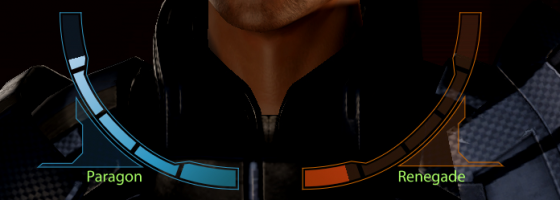As video games began to offer players the ability to affect the story, one of the most used mechanics in game design was a morality slider: allowing players to determine how good/evil their character was.
While popular, it is a mechanic that I’m not a fan of for several reasons which we’re going to talk about here, along with several series that handled morality better.
The Good, Bad and the Ugly:
The idea of controlling a character’s morality came into popularity thanks to Star Wars: Knights of the Old Republic. The game allowed players to decide the character’s response in dialogues and affect their morality in the form of light side and dark side choices. This in turn determined what force powers the player could unlock and how the ending of the game played out.
Following KOTOR’s success, we saw a variety of games instill added replayability to their titles using morality sliders. From other Bioware titles to even action games like Spiderman: Web of Shadows and Infamous.
I preferred the evil options in superhero games as it was always neat to see how far the designers would go with turning a beloved character evil. Web of Shadows went pretty crazy for Spiderman and ended with him becoming the ruler of the symboites.
But with that said morality sliders to me feel like false choices and never truly giving the player an accurate perception of either side.
Let’s talk about gameplay balance as that is the quickest argument for this post. When designers think of good/evil in terms of game mechanics, it’s always the same format — Good = healing, shields and defense, and Evil = damage, explosions and super moves.
Now if games built around morality sliders actually had legitimately different ways to play the game like the original Deus Ex, then having the mechanics set up that way would be fine. But similar to Deus Ex: Human Revolution, if no matter what you’ll do, you’ll still have to fight bosses, why wouldn’t you want stronger attacks to finish them off?
What’s worse is if the designers completely segment the player’s abilities that the only way to get better combos or do more damage is to be evil or good. In that case, the player can make the game harder and making good and evil a false choice.
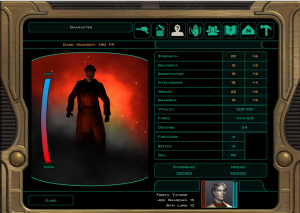
The unlocking of force powers was one of the main gameplay motivators for going further to either the light side or dark.
That is what happened in Dante’s Inferno where players who went up the holy tree would find that many enemies and the final boss were completely immune to holy attacks.
Now, I know that some of you right now are going to say that being the good guy and taking the moral high road should be harder.
But that brings us to the other point for this piece: the problem with defining morality.
Ethical Carnage?
As designers have been trying to elevate video games as an artistic platform, we have seen game stories become more mature In return, trying to make the player’s choices matter more in the grand scheme of things.
However, for such a high level concept, morality in games usually takes an elementary view at best. The immediate problem is the simple defining of good and evil.
Looking at grand events it can be easy to define actions as good or evil: The Mongol horde rampaging across Asia was easily defined as evil while providing medicine to the sick would undoubtedly be good.
But when we talk about individual or personal choices, we can see how morality is more about shades of grey instead of black and white.
Imagine if you are on a quest to save a kingdom and you need money to buy resources. You come across orphans begging for money, in a traditional video game, giving your money to them would be a good act, while holding on to it would make you evil.
But if we look at the big picture, if you fail in your quest then everyone dies including those orphans and if money was tight, wouldn’t the greater good mean holding onto that money to use towards saving everyone?
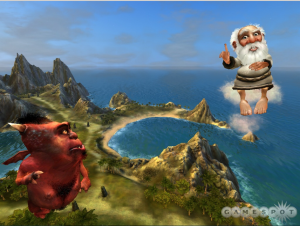
The Black and White series took the concept of the angel and devil and ran with it for its morality system.
Another cliché is the in-game representation of the little angel and devil on your shoulders in the form of the supporting cast.
These characters always stand out from their actions, to their clothing and act as the stereotypical good or bad guy.
The good guy is typically naive to a fault, while the bad guy gets upset with you if you don’t go around stealing wallets and kicking puppies.
The problem with most video games that deal with morality is that the events themselves are viewed within the microcosm of the event and not the world itself. There are no repercussions to the player outside of an ambiguous slider.
The slider itself is the true judge of your character and instead of giving the player freedom to choose, it removes it. Either by giving the player one final choice that effectively locks the player in no matter what they’ve done, or only viewing the player’s motives as absolute good or evil.
It doesn’t matter what choices you made over the course of the game, if the slider is on the evil side at the end then you’re evil and the same goes for being good. And we could have a whole discussion on the topic of having to quantify actions and why action A adds +5 Evil Points while action B only adds 3.
In the original Bioshock, the second you choose to kill one of the little sisters for Adam, then the game views you as the antichrist times ten no matter what happens after.
Bioshock’s example is the cusp of what annoys me about traditional morality in video games and how designers only represent it at the cartoony extremes. There is more to being good than blindly doing what everyone asks just as there is more to being evil than acting like a jerk.
Speaking of acting good and evil, one area that video games built around morality sliders mess up on, is the concept of neutrality. Many games actively punish the player for trying to remain neutral: such as having vitally useful abilities and bonuses on the far end of either spectrum.
As we talked about, real morality is about dealing with the shades of grey such as making the right choice for the wrong reasons or vice-versa. Some games have attempted to move away from good and evil and in the process have made deeper worlds and characters.
The Grey Area:
Some of my favorite game stories built around choice came from games that avoid morality all together and focus on choice and repercussions.
In Tactics Ogre for the PSP, the game is about the conflict of a civil war in the land. The player must decide who to fight for and there were problems with both factions. One of the first choices the player must make is to kill rebel civilians to force the invaders to back down and prevent more bloodshed, or side with the rebels and get into a giant fight.
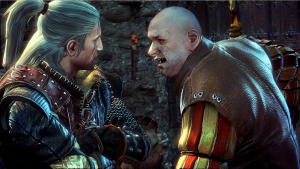
The world of The Witcher was not about good or evil characters, but people doing what they feel is right.
What happens is that the player’s view of the world and the characters around them shift based on their choices.
The main character’s best friend’s character portrait has a noble look to it when you side with him. But if you decide to break off and join the rebels, his portrait changes to make him look crazy and violent to represent the shift.
Many choices came back to haunt you and if you weren’t careful, one character committed suicide instead of joining you based on how you have reacted up until that point.
Another example is from the first Witcher game, while the player controlled the pre-established character of Geralt, they are free to decide his reactions to the world around him. The world of the Witcher is made up of humans and mutants or fantasy creatures. The game was full of strong racial undertones as both human and mutants hated each other which lead to a massive battle.
As a Witcher, Geralt was half mutant and existed between the two factions. This forced the player to make numerous choices that would come back to affect them in later events and how the two sides viewed Geralt. The brilliant part about The Witcher was that neither side was all together good or evil. While many mutants were persecuted in the game, there were a lot who would go around killing innocent people.
Likewise, while there were plenty of good humans, there was also a religious order that viewed mutants as evil creatures who must be wiped out. No matter what side Geralt ultimately choose (and he could remain neutral,) both good and bad people would be killed by his actions.
The games that we have talked about dealt with choices, but kept away from big concepts like “good and evil” to deal with personal choices. While both games have done a good job of creating choices, the last game example not only deals with choice, but on creating meaningful characters.
The main branch of the Shin Megami Tensei games always has the player making morality choices to dictate how the game will end. One of the themes of the series has to do with rebirth and letting the player decide how things will develop.
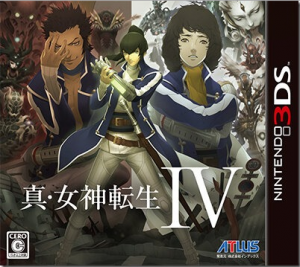
The Shin Megami Tensei series is one of the few games with morality that allows players to remain neutral.
The games feature three possible moralities: Law, Neutral and Chaos. It’s important to note that I didn’t say good or evil as the characters themselves don’t view their choices as black and white as that.
Law represents order, tradition, uniformity and given the games use of angels and demons, the belief in a higher power. Chaos represents freedom, Darwinism, power and only believing in your actions.
The writers for the games do a good job of making neither choice seem like the best one, as both taken to their extremes can be seen as bad depending on your point of view. To help show the player that, it is customary in a SMT game to give the player friends that represent those extremes.
But where other games would start those characters off at the extreme, in SMT they begin neutral and slightly leaning towards their chosen sides. What ends up happening is that when faced with the choices and severity of the situation, they fall back on their belief system for there rationality until it is their only way of seeing the world.
It’s usually not until the end of the game where the player must decide how to react to their former friends that we see how the extremes of either side play out. Either as someone who believes that everyone must give themselves to a higher power, or that only the strong have value.
If designers want to make choices truly matter to the player then the best thing to do is to make them more personal and farther reaching. Obviously this will require a lot more time and work compared to a simple slider, but it can elevate a game’s story so much when the player can’t fall back on being good or bad as their M.O. for their decisions.

